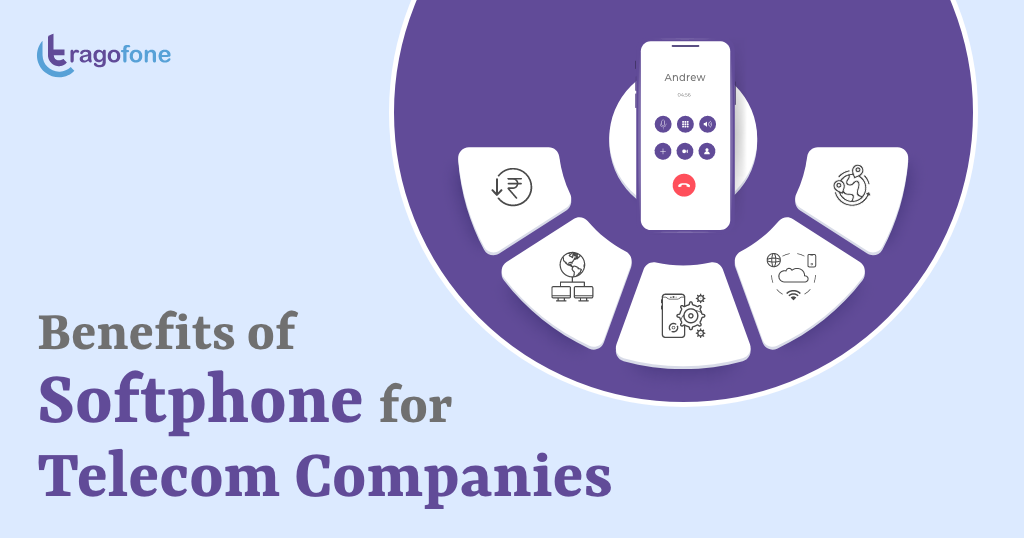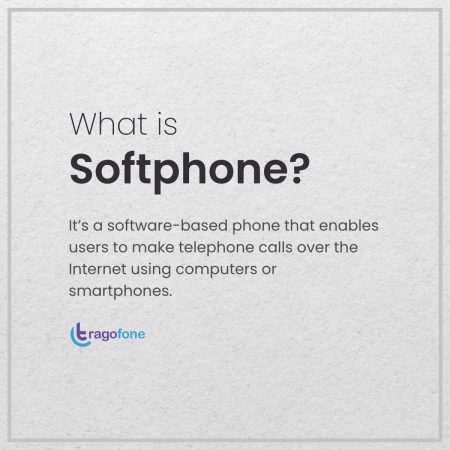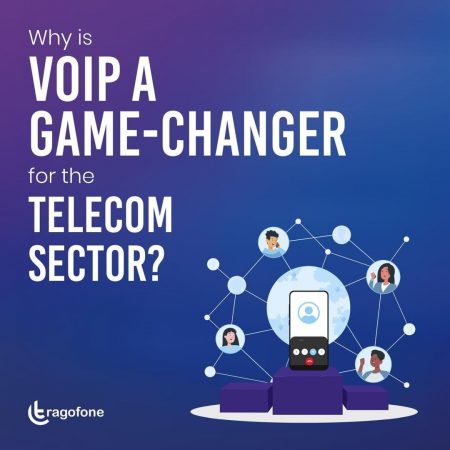
The global telecom industry has been undergoing a seismic shift in the last few years. The technology that has driven this change is Voice over Internet Protocol or VoIP. VoIP-based mobile dialer phones – or Softphones – are an entirely new way to make voice and video calls. As this technology matured, its impact on the telecom sector has increased. Today, VoIP is the driving force behind many telecom majors and continues to grow in influence.
An important reason for the growth of VOIP technology is the increased global reach of businesses and changing working models. The gig economy is growing, and the changing nature of business requires organizations to retain the ability to communicate anywhere in the world at a minute’s notice.
A report by UK’s Ofcom suggests that “in the coming years’ broadband-based call services will become increasingly common, as PSTN is reaching the end of its life, becoming increasingly difficult and costly to maintain. Many major telecom providers are offering VoIP products delivered over broadband to their customers.”
How are VoIP-based mobile dialers changing the telecom industry?
A 2021 Global Market Insights estimates that the size of the VoIP market was over USD 30 billion in 2020, and is expected to grow at a CAGR of 15% from 2021 to 2027. Innovation by the VoIP industry, as well as improved internet connectivity, is driving this trend. Also, with over 80% of global organizations adopting Unified Communications, it is clear that softphones have a booming market.
In this blog, we will look at the VoIP mobile dialer technology and how it has metamorphosed the global telecommunication space.
- What is a Softphone or VoIP mobile dialer and how does it work?
- Why Softphones are a game changer for the telecom sector.
- Benefits that telecom companies can offer global enterprises through VoIP-based softphones.
- What advantages do telecom companies get by offering VoIP mobile dialers to enterprises?
- The future of a VoIP-powered telecom sector.
Softphone for business: What it is, How it Works, and its USP for telecom players
What is a Softphone or VoIP mobile dialer and how it works
 Softphones are software-based dialers that can be used on any computing device. They are quick and easy to deploy as well as maintain, and system admins can implement and update VoIP software across all machines in one go. Since no new hardware installation is required, they’re cost-effective as well, with organizations needing to pay only licensing and service fees.
Softphones are software-based dialers that can be used on any computing device. They are quick and easy to deploy as well as maintain, and system admins can implement and update VoIP software across all machines in one go. Since no new hardware installation is required, they’re cost-effective as well, with organizations needing to pay only licensing and service fees.
VoIP-enabled softphones are the new way of making voice calls – as it revolutionizes the way audio voice calls are transported. In traditional telephony, the sound was converted into electrical signals, which were then transmitted through a network of phone lines. This system is called a Public Switched Telephone Network (PSTN).
Voice calls work differently with VoIP. Now, the audio doesn’t get translated into electrical signals. Instead, it is converted into internet protocol (IP) data packets that are transported via the internet from one end of a call to the other. Softphone devices include computers, smartphones, or tablets. The software itself is provided by a dedicated VoIP telephony service provider.
Modern softphone applications have an accessible, user-friendly interface that users can navigate with ease. This means an organization’s entire workforce can make calls using their own devices while using simple and familiar dialing and calling experience.
Now that you know what a softphone is, let’s understand how it’s changing or impacting the telecom sector.
Why Softphones are a game-changer for the telecom sector

In an established commercial sector like telecom, not all new technologies capture the collective industry imagination like VoIP mobile dialers have done. Why has this new technology taken such a hold over the telecom sector?
The answer to this question can be found in the number of advantages VoIP offers over the older telephony method.
As VoIP technology gets more mature and better developed, its benefits outrun PSTN on a number of fronts.
Telecoms companies and carriers, then, have little choice but to adapt to VoIP. It’s what customers want, so it is what they must deliver. Also, it is not only customers who will benefit from a switch to VoIP dialers.
The seemingly unstoppable migration to VoIP is good news for telecoms firms, as there are several notable advantages for them too. Let’s look at some of these advantages:
Making calls via VoIP is more cost effective than doing so via a PSTN. A VoIP mobile dialler doesn’t need expensive hardware installation or phone lines. It can be up and running in the time it takes to install the required software. Since geographical distance doesn’t matter in VoIP calls, long-distance calls don’t come at a premium.
Modern organizations are no longer restricted to a single geography. Companies work out of multiple premises and even encourage remote working. VoIP telephony is in sync with this modern, mobile style of working.
VoIP mobile dialer systems offer users more than just voice calls. They deliver Unified Communications as a Service. Voice calls, instant messaging, and video conferencing can happen through one system.
The traditional PSTN relied on an aging infrastructure. Telecom companies often ended up providing services using outdated copper wire phone line networks. As these networks got older, the cost of maintaining them rose multiple folds.
Also, a physical network of phone lines is vulnerable to issues like weather or vandalism acts. VoIP-delivered services are much easier to maintain and fix.
Across the world, major telecom carriers are already leveraging VoIP technology, building internet protocol (IP) based networks to provide both voice calling and broadband services. Relying on such IP-based networks is far more convenient for carriers as they don’t have to maintain a separate PSTN for call services.
Benefits that telecom companies can offer to global enterprises through VoIP-based Softphones
The move to Unified Communications (UC) by businesses around the world is unstoppable. A Grand View Research forecasts that the global UC market will register a CAGR of a whopping 17& from 2019 to 2025.
Workers are increasingly demanding packaged mobile solutions and organizations are driving softphone adoption in a big way. This means that ignoring the opportunities this market presents is not possible anymore.
As the COVID pandemic unfolded, enterprises of all sizes transitioned their workforce to remote working technologies.
A major challenge for many businesses, especially small companies with limited resources, is to equip their remote workers with the right tools. No business can afford to lose touch with its customers, which makes communication technology a key requirement. In fact, many work from home employees use their own devices, be it a desktop or mobile phone. This makes Softphones a handy tool. What are its advantages for organizations?
- Low cost and minimum hardware
Softphones can be downloaded on existing devices, eliminating the need for hardware investment, cabling requirements, or dedicated lines. If a softphone requires a software upgrade, most providers let you upload the latest version for free.
To make communication quick and seamless for employees, downloading a softphone is the easiest option. That way, new employees can be easily provided with a phone and phone number in no time. In fact, some companies are avoiding landlines altogether by switching to VoIP and taking advantage of softphone options.
No one wants to give out their personal number for work purposes. Softphones allow employees to hand out one business number through a simple softphone app download on their mobile device or laptop. This way, they don’t miss any calls and don’t compromise on privacy.
Most softphone applications include video conference capabilities. This is a very useful feature for organizations that conduct frequent meetings with external clients or with overseas teams.
Most softphones come with end-to-end encryption and have systems to detect and stop fraudulent callers, keeping organizations, their employees, and their data safe. They also have firewalls against hacking and making fraudulent calls on a company’s behalf.
- Benefits of unified communications
As more and more telecom companies offer a VoIP-powered common communication platform across devices, it makes it easier for employees to communicate with one another and simplifies the way they connect with clients. They can schedule conference calls, send instant messages, converge voicemails with emails, and access several other communication options that PSTN and traditional phones do not offer.
- Softphones are future proof
Like any software, a softphone app can be easily upgraded. This enables organizations to have access to the latest features and functionalities when updates are rolled out, without investing in any additional equipment.
- Softphones support BYOD policies
A bring your own device policy encourages employees to use their own devices. This works well for remote workers, and employers don’t have to incur the costs of providing equipment. Softphones easily fit into an enterprise’s BYOD policy as users can convert any device into a business communication tool.
What advantages do telecom companies get by offering VoIP mobile dialers to enterprises?
The telecom sector was originally built on the foundation of the Public Switched Telephone Network (PSTN). This network required telecom companies to invest heavily in physical infrastructure.
VOIP mobile dialers do not require such an infrastructure, as the entire process of making and receiving calls happens on internet waves. Audio is transformed into data packets whenever a call is made. VoIP technology uses the internet to carry data packets to call recipients anywhere in the world. This process of conversion to data packets happens in the same way that all forms of online information are sent or received.
The benefits of Softphones far outweigh that of PSTN. In terms of connectivity, they do not require public bodies or private companies to establish and maintain physical infrastructure – only an internet connection is needed.
Similarly, expanding and upgrading PSTN requires huge financial investments. For VOIP mobile dialers, the upgrade can happen with a simple software update.
Many of the features that are offered on VOIP mobile dialers, such as call waiting or call forwarding, come as part of a complete package, and at no extra cost. On the other hand, most of these are paid features on PSTN.
Major telecommunication companies are moving to VOIP dialer services because advances in internet technologies, such as 5G networks, remove obstacles for VOIP such as internet speed.
The future of a VoIP-powered telecom sector
What does the rapid advance of softphones mean for the future of the telecom sector? Will it displace traditional telephony and become the communication technology of the future? Current trends and statistics definitely point towards this.
Let’s consider the US market. The shift to softphones is accelerating in North America, and some experts predict that the technology could replace PSTN as early as 2025. To stay in tune with this trend, many leading telecom firms are already moving significantly towards VoIP dialers. Also, many big US companies already power landlines via VoIP.
In a report on the future of fixed telephone services and the growing traction for VoIP, the United Kingdom’s Ofcom observed: “PSTN is reaching the end of its life and becoming increasingly difficult and costly to maintain. We recognize that the migration to VoIP is necessary to ensure the continued provision of reliable landline telephone services given that the PSTN can no longer be sustained in the long term.”
There is growing consensus that VoIP mobile dialers are the future of the telecom sector. To survive and prosper, all telecom companies will have to become VoIP-enabled firms.
Conclusion
The telecommunications industry is changing, and VOIP telephony technology is set to replace older PSTN systems that are currently in place. It is no longer if, but when.
VoIP has been proven to be a more superior and feature-rich technology. For organizations, there are added benefits and significant savings on communication costs. There are already VoIP services in the market that cater to the unified communications needs of businesses. For companies that wish to cut down on expenses and boost communication efficiency, VOIP mobile dialers are the way to go.